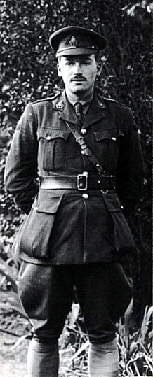
In 1911 Aldington met society hostess Brigit Patmore, who introduced him to American poets Ezra Pound and Hilda Doolittle, who published as H.D, and whom he married two years later. In 1914, the American poet Amy Lowell introduced him to writer D.H. Lawrence. T. S. Eliot was also acquainted with Aldington.
Aldington joined the Army in June 1916 and was sent to the front in December, where he dug graves. By the end of the war, he had become a signals officer and temporary captain. He was demobilised in February 1919.
Aldington found the lice, cold, mud and unsanitary conditions of a soldier's life degrading, but he managed to write poems, essays, and begin work on Death of a Hero, a semiautobiographical novel while still overseas. His encounters with gas on the front affected him for the rest of his life.
Aldington had difficulty returning to his former life after the war. He felt distant from his poet friends who had not undergone the tortuous life of a soldier, and felt they didn’t understand what he had gone through. Although published four volumes of poetry, Images of War and Images of Desire in 1919, Exile and Other Poems in 1923, and Roads to Glory in 1930, he never regained his prewar confidence in his own talent as a poet. He quit writing poetry entirely after suffering a nervous breakdown in 1925. His marriage also suffered, and he divorced his wife in 1938.
Like many American writers during this period, Aldington went into self-imposed exile. He moved to Paris in 1928.
In 1955 Aldington published a biography of T. E. Lawrence that caused a scandal by making public Lawrence's illegitimacy and homosexuality. His own reputation never recovered after he attacked the popular hero as a liar, a charlatan and an "impudent mythomaniac." Another English Poet from WWI, Robert Graves called Aldington "a bitter, bedridden, leering, asthmatic, elderly hangman-of-letters." Many wonder if he was still suffering from his trauma in the trenches.
Aldington died on July 27, 1962, shortly after his seventieth birthday.
Trench Idyll
He on a lump of frozen earth
Blown in the night before,
I on an unexploded shell;
And smoked and talked, like exiles,
Of how pleasant London was,
Its women, restaurants, night clubs, theatres,
How at that very hour
The taxi cabs were taking folk to dine …
Then we sat silent for a while
As a machine gun swept the parapet.
He said:
“I’ve been here on and off two years
And only seen one man killed.”
“That’s odd.”
“The bullet hit him in the throat;
He fell in a heap on the fire-step,
And called out ‘My God! dead!'”
“Good Lord, how terrible!”
“Well, as to that, the nastiest job I’ve had
Was last year on this very front
Taking the discs at night from men
Who’d hung for six months on the wire
Just over there.
The worst of all was
They fell to pieces at a touch,
Thank God we couldn’t see their faces;
They had gas helmets on …”
I shivered:
“It’s rather cold here, sir; suppose we move?”


